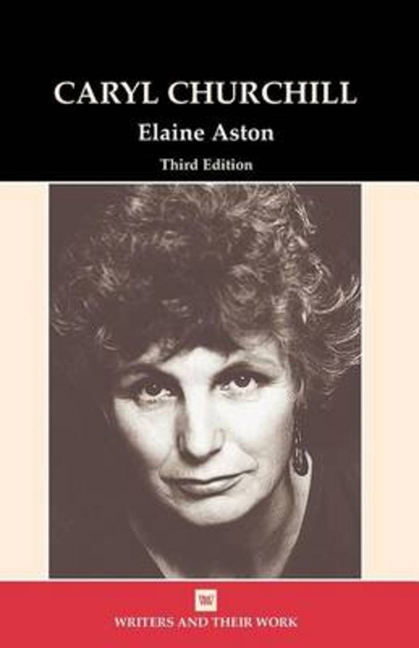Book contents
- Frontmatter
- Dedication
- Contents
- Acknowledgements
- Biographical Outline
- Abbreviations
- Preface
- Prologue
- 1 Beginnings: Radio, Stage and Television
- 2 The ‘Woman Writer’
- 3 The Dramatist as Socialist Critic
- 4 Communities in Dramatic Dialogue
- 5 Exploding Words and Worlds
- 6 1997 - Far Away
- 7 A Royal Court Celebration
- Notes
- Select Bibliography
- Index
2 - The ‘Woman Writer’
- Frontmatter
- Dedication
- Contents
- Acknowledgements
- Biographical Outline
- Abbreviations
- Preface
- Prologue
- 1 Beginnings: Radio, Stage and Television
- 2 The ‘Woman Writer’
- 3 The Dramatist as Socialist Critic
- 4 Communities in Dramatic Dialogue
- 5 Exploding Words and Worlds
- 6 1997 - Far Away
- 7 A Royal Court Celebration
- Notes
- Select Bibliography
- Index
Summary
In 1977 Ann McFerran conducted an interview for Time Out with nine British women playwrights, and headed the commentaries with the statement ‘the male-dominated theatre is giving way (somewhat)’.1 In retrospect, our ‘male-dominated theatre’ hardly seems to have given way at all, but those women in touch with the Second Women's Liberation Movement in the 1970s were, in the climate of feminism, able to view the possibility of a more equitable future with a degree of optimism. Gillian Hanna, a founding company member of Monstrous Regiment, with whom Churchill worked on Vinegar Tom (1976) and the Floorshoiv cabaret (1977), recollects:
Feminism was leaping in our heads…To be a woman in 1975 and not to have felt the excitement of things starting to change, possibilities in the air, would have meant that you were only half alive…
… we wanted to change the world. At the time, this didn't seem like such an outrageous project. All around us, women in every area of the world we knew were doing the same thing. It seemed as natural as breathing.
But much more exciting than breathing. Exhilarating. The sense of being in the right place at the right time, in step with a great movement in history, part of history, making history ourselves. We were part of a huge wave of women and we were going to remake everything. It gradually dawned on us that we didn't have to go out and join any movement. We were already in it. We were the Movement.
If change was not immediate, then feminism at least enabled women to express their discontents, or, as Churchill argued in McFerran's interview, ‘one of the things the Women's Movement has done is to show the way the traps work’. The ‘traps’ specific to theatre, which the women playwrights discussed in McFerran's interview, included male bias of their profession, the paucity of roles for women, the ways in which their voices had not been heard in the theatre, and the difficulties of combining a playwriting career with motherhood.
When questioned about her writing and feminism, Churchill observed:
For years and years I thought of myself as a writer before I thought of myself as a woman, but recently I've found that I would say I was a feminist writer as opposed to other people saying I was.
- Type
- Chapter
- Information
- Caryl Churchill , pp. 17 - 45Publisher: Liverpool University PressPrint publication year: 2010



